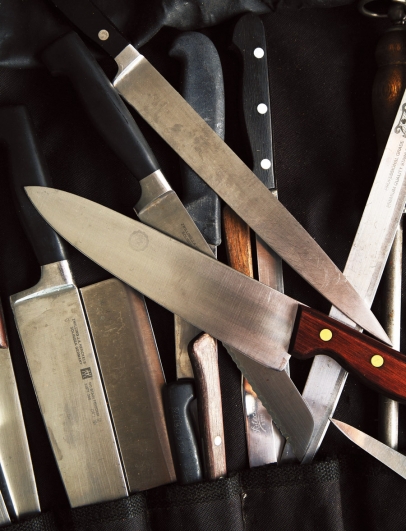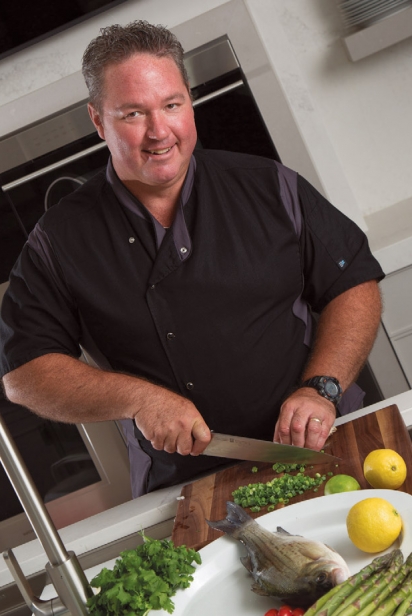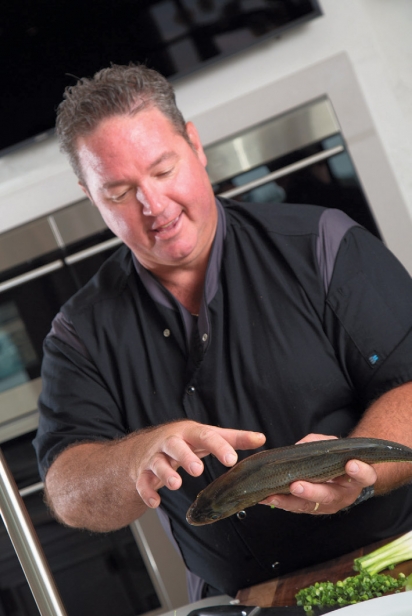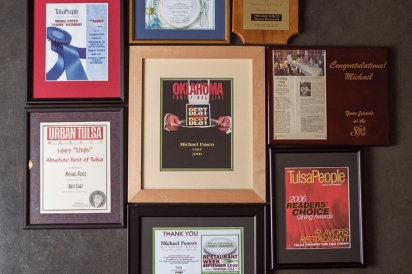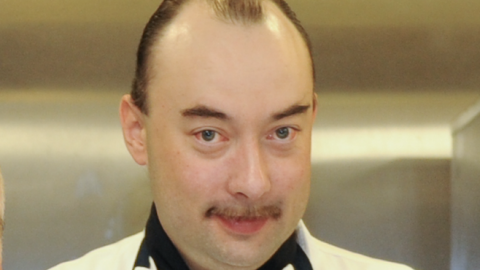Chef Michael Fusco Remains an Icon
“I always loved to eat, starting at a kid.”
Few would argue whether Chef Michael Fusco is a Tulsa icon. His prowess at the stove has won every award worth mentioning. His selfless contributions to dozens of community organizations and the Catholic Church speak for themselves. His life hasn’t always been a pleasure cruise. Life in rural New Jersey was modest, yet there was always delicious food.
The family garden produced such an abundance and array of vegetables, summer suppers could consist of plates of succulent produce, nothing else. “It was so amazing,” he reminisces above the noise of the Bodean bar traffic. “It heavily influenced my decision to be a chef.”
Those fresh, local and in-season foodstuffs created a fire in his belly to cook.
Born to a 40-year-old mother with other kids in the household, Fusco became her sous chef. Meal preparation was his primary domestic responsibility in the idyllic setting of Delran Township, southwest New Jersey.
“Delran” combines the names of the Delaware River and Rancocas Creek, which converge nearby. It is the largest watershed in the state. It was a farming community like Bixby was 25 years ago.
The township is next to Riverside, a 200-year-old Delaware River town whose economy during Fusco’s formative years relied on cloth mills and a watchcase factory. Larger, bookend communities were Cherry Hill to the south and Willingboro to the north, across a Highway 130 bridge over Rancocas Creek.
His parents, Gene and Anne, bought a house at the end of Chester Street next to where Gene’s mother still lived on the old homestead of their 100-acre truck farm. His dad grew up on that fertile acreage, located at a major intersection where he sold produce and traded with other farmers. Locals grew corn, tomatoes, cabbage, strawberries and other produce.
A vegetable stand along the road in front of Grandma’s house operated on the honor system. Folks drove up, sacked what they needed and put money in a jar. Michael used the stand as a pantry for Mom’s cooking needs. She was his biggest culinary influence.
Anne Fusco was old-school. In the 1960s and ’70s people still cooked all their meals at home. So, she took care of the kids, the household and prepared all their food. Michael liked food, even as a kid, and relished helping out in the kitchen.
Near their house was a huge cornfield that was replanted four times a year. The sweet corn was perfect from the Fourth of July to a week or two past Labor Day, depending on the spring weather. There were country stores next to apple orchards that supplied local cider as well as apple donuts—light as a Krispy Kreme—offered free to the kids. The Norman Rockwell-esque Delran was a melting pot.
The community was Italian, Polish and German. As a youngster, Michael recalled going to a pasta and bread shop run by Italians and other ethnic shops for their home-country specialties. Some provisions were only a few feet away.
The Fuscos’ backyard—a farm in an earlier life—yielded wild asparagus. Along the back fence were fingernail-sized raspberries that were “tart, very tart and delicious.” Mulberry trees grew everywhere, which created a problem. Birds loved the mulberries and left brightly colored deposits, permanently staining the Fusco sheets, hanging on the clothesline. The berries found their way into Anne’s cuisine.
Michael Fusco’s first cooking job was working in a Catholic rectory during sixth grade. He fried eggs and served omelets, sandwiches and the like to the seven priests, when their housekeeper was not there. “They were all cool guys,” the chef added. “It was a lot of fun.” Years later, his first paying kitchen job did not involve food service.
During high school, Michael worked in Edgewater Park at the Golden Dawn Diner, a Greek restaurant several miles north of his home, straight up Highway 130, across the bridge. He washed dishes, pots and pans. He also daily peeled four boxes of potatoes, a 35- to 50-pound bag of carrots and two bags of onions. Didn’t matter what work they threw at him, being a chef had become his passion. Dad was not overly thrilled.
The opportunity to serve in the Navy had been the ticket off the farm for Gene Fusco. As a Depression kid, he wore his older brother’s hand-me-downs and the family scraped by, enduring a tough life. As a military man he had three-square meals a day; all he had to do was work and he was used to that. Gene wanted that security for his youngest son, but Michael wanted to cook.
The diner quickly moved the 16-year-old, gung-ho employee up the food chain. His first real cooking job was breading vegetables and dropping them into one of the five fryers. Dipped in an egg wash with buttermilk, flour and water, the tasty fried nuggets of zucchini, mushrooms, broccoli, cauliflower and any other vegetables in the cooler were the foodies’ rage of the day. He fought to keep up with the orders, tossing them onto the wax paper in plastic baskets along with blue cheese or a doctored mayonnaise sauce. The acned apprentice got used to being yelled at by the kitchen’s expediter—he shoveled out the fried morsels as fast as possible. By the time football season rolled around, thus ending his career at the Golden Dawn, Fusco was cooking burgers and hot dogs.
He kept his hand in the food industry working on the weekends, doing prep work at the Skylark, an Italian restaurant, and learning how to cook “real” veal instead of pork loin, like some joints did and passed it off as veal. Pounded out, breaded and covered in cheese and tomato sauce, the pork slices were more tender than the sometimes sinewy veal. Those who dished out the faux veal irked the wannabe chef.
Fusco relatives made their Italian favorites. One aunt’s specialty was ravioli. The four aunts on his mother’s side cooked and a nocompetition rule was in effect: Each sister was careful not to make another’s pride and joy dish, less they might be compared and ignite sibling rivalry. And his mom’s delicacies found their way into other homes. If there were a death or a birth in the neighborhood, Anne Fusco’s favorites showed up on their doorsteps. Yet, her generosity did not interrupt Gene’s law requiring everyone to share the evening meal together. Fusco continues this family tradition, teaching his own son, Michael, and daughter, Bella, cooking skills, appreciation of different foods and the importance of daily communion with family. Food was an integral part of the New Jersey family fabric and fish was the dominant protein.
There was so much fish in the garden state that Fusco’s good Catholic family ate fish on Fridays, even if it wasn’t Lent. Besides, flounder was cheaper than beef. With ’30s-era parents, practicality was engrained. So was education.
During his junior year in high school, Michael toured the Culinary Institute of America (CIA) in Hyde Park, New York, as well as food-focused Johnson & Wales University in Providence, Rhode Island, and Paul Smith’s College in upstate New York. Part of the CIA application requirement was a letter of recommendation from a Certified Chef and Michael did not know one. He entered the prestigious four-year program at Johnson & Wales, graduating in 1986. Finishing near the top of his class, the school offered him a two-year teaching fellowship, which groomed him to be a proper chef.
A vital part of his fellowship involved guiding the young culinarians through daily prep and cooking for local, commercial restaurants. Fusco was the liaison between the executive chef and the students. Every 10 days brought a new group of 15–18 students. Andy Lussier was the chef who oversaw this program at Johnson & Wales. Fusco described him as “hard core, a great sense of humor but intense on how things should be done, throwing your food into the trash can if he didn’t think it was done right.” Fusco learned quickly as he anticipated his career path.
The future Tulsan went to J&W with John Shuler, a friend of David Kennedy, the original chef of Bodean Seafood. Kennedy rang up Fusco, who was living in the Italian area on Federal Hill in Providence, to see if he might be interested in working at Bodean in Tulsa, because John had said Fusco could cook fish. Despite his skepticism about fresh fish in a landlocked city, the Jersey boy accepted the invitation and Kennedy sent a plane ticket.
Fusco looked up Tulsa in a tattered Encyclopedia Britannica. It highlighted the Tulsa Driller and tumbleweeds. The faded text called it the Indian Capital, showing images of teepees and cowboys riding the range. Arriving at Tulsa International in late April 1986, Fusco was greeted by a postcard-perfect day. Kennedy served him a Bodean meal that arrived in the shotgun dining room of the strip center at 51st and Harvard through a little window in the wall of the kitchen. As great as his visit was, he considered other options.
Fusco’s short list included the vaunted Versantes in Cincinnati, Pier 66 in Ft. Lauderdale and the Cambridge Marriott. He chose Bodean. He chose Tulsa. His J&W fellowship had brought him enough riches to buy a Pontiac Grand Am, which carried him and his few worldly possessions to the former Indian Territory. Fusco considered Bodean a great stepping stone to his ultimate desire: to cook fish for Wolfgang Puck. By his own admission, he was a little starry-eyed and naïve about the industry.
The Tulsa restaurant environment had just suffered a meltdown due to the ’80s oil bust. Fusco was fortunate that Bodean had a successful fish market that could prop up the restaurant. When Kennedy left Bodean in a huff, the young buck inherited the kitchen, used his J&W education as his guiding light and insisted on fresh fish only. The South Tulsa seafood establishment became a culinary powerhouse. Badda bing, badda boom.
His operating definition for fine dining mandates that as many ingredients as possible be fresh, local and in-season. At Bodean he primed the produce manager at the Skaggs grocery store across 51st street with restaurant offerings so that he could buy all the mesclun greens as soon as they arrived. To reach his standards, he needed more than fancy lettuce.
The “Gardner Guy,” Paul James, was a Bodean regular. James knew Fusco needed unusual vegetables to supplement his creations and grew them for the chef. In the spring and fall, Bodean boasted a “Gardner Guy” salad. Turned out that James’s organic agriculture was ahead of the times by three decades.
Today, the “farm effect” is in full swing. Young people enthusiastically support the notion of healthy, local produce and many are setting up greenhouses and small farms to provide the goods. From the start, Fusco connected with Conrad Farms in Bixby. Tuesdays and some Fridays he met the trucks coming into Conrad’s to see what they were carrying: purple-hulled peas to beans to corn and tomatoes to zucchini. The weekly Bixby trips transported the aggressive chef-with-the-East-Coast-accent home to the truck farms of his cherished upbringing. There were other pioneers of fresh produce for Tulsa’s elite kitchens.
“Joe Tierney was the single greatest reason that other chefs and I could serve the quality foods that we did,” said Fusco. “He took his truck down to Dallas so he could get the freshest and most exotic produce for the Tulsa market.” Other purveyors were good, but some had the business practice of selling the oldest raw products first. “First in, first out is such a disaster when it comes to food,” the passionate chef explained. Many say his insistence on fresh combined with his talent created a culinary legend that boosted local food awareness.
Today, an enthusiastic public supports the myriad of farmers’ markets that dot the Tulsa landscape. During an interview, Chef Fusco, 52, was asked if he thought Americans could ever get healthy again. “I think it has already changed—just a matter of time before it starts showing.” he replied. “Produce has never been better, stores are even selling untreated chicken. I see nothing but good and am so optimistic that, if parents make the right food choices, the kids of the nation will be fine, diet-wise.”
Additionally, refrigerated food trucks with fresh, local produce and meats are finding their way to Tulsa neighborhoods that are not close to grocery stores.
During his time in Providence, Rhode Island, the chef recalls fish and chicken trucks that came through his neighborhood three times a week, honking their distinctive horns at the same times, the same days of the week. Now their trucks have expanded to include herbs, produce, sandwiches and the like.
Refrigerated trucks raise the availability of high-quality fresh produce that has not been genetically engineered to last longer than nature intended and has a better shelf life. This allows chefs to present the vegetables simply without having to design complicated food preparations so they are presentable to eaters—basically, overworking the aging produce. To him, the general public has awakened to the benefits of healthy eating.
Fusco likes the trend of reconnecting to the earth, going back to the farm, supporting local street markets. He sees the pendulum swinging back to farm-to-table freshness, local and in-season. Serve asparagus from April through July when it is in season, he says, not in November. “That is gourmet,” the chef reminds the journalist. Fusco knows gourmet.
By the mid-’90s, Chef Fusco was the toast of the town. Bodean was wildly successful and an Oklahoma City store was considered. Fusco was in the thick of the planning. The expansion idea cooled suddenly, but he had the bug to start his own restaurant. It took a year before Michael Fusco’s Flavors opened at 71st and Sheridan, replacing the iconic Pennington’s last store. Flavors boasted American Cuisine.
To Fusco, American Cuisine is fare that blends all of the bi-costal ethnicities of the nation, using products from the immediate area. The Flavors kitchen satiated the growing foodie phenomenon while training many of today’s executive chefs.
During his years with Bodean and Flavors, Fusco won the Best Chef in Tulsa so many times, the only drama left was who might finish second. He was a rock star. Yet he left the private sector after exiting his Michael Fusco’s Riverside Grill to become the chef for the Union Public School System.
Charged with ensuring healthy menus for the students, Fusco was reintroduced to the taste of teaching. After a year he accepted a position in the Design Department for National Steak and Poultry in Owasso. Yet years of standing on concrete kitchen floors had taken its toll on the joints of the high school footballer and avid snow skier.
Surgery to repair Fusco’s left knee in early 2015 started a physical chain reaction that lead to shingles to meningitis and extended treatment at the Mayo Clinic. For a period, he lost sight in his left eye and suffered bad bouts of vertigo. Nerve damage to his left ear made walking tenuous. Through the recent year and a half of medical challenges, his wife, Jackie, has been his anchor, his cheerleader, as always.
His recovery is nearly complete and he experiences only occasional left eye vision disturbances. The network of Chef Fusco’s cadre of friends continues to stand by their decades-long relationships with him.
Using his experience as the chef at Union Public Schools, he worked as a consultant for the State of Oklahoma, traveling to four districts to encourage a healthy dosage of local fruits and vegetables in their menus and showing them chef/restaurant techniques like batch cooking several times a morning to keep the foods fresher and more flavorful for the students. For the 30 years that Fusco has been serving Tulsa, fresh flavors have always mattered.
Utilizing nature’s bounty grown within the region, Fusco plans on a downtown location for a take-home, field-to-table facility. Featuring local growers and using products only in season, the charcuterielike store with Fusco cooking on premises during the day will serve wild game sausages in the fall, asparagus combinations in the spring and year-round local meats with grill marks already seared in for the home cook to warm and serve. Foodstuffs like bone soup—a nutritious broth made by cooking down bones—are staples that, Fusco believes, food- and health-conscious Tulsans want year around and they want them in a convenient form to serve at home.
The career of Chef Michael Fusco continues to evolve, naturally.


